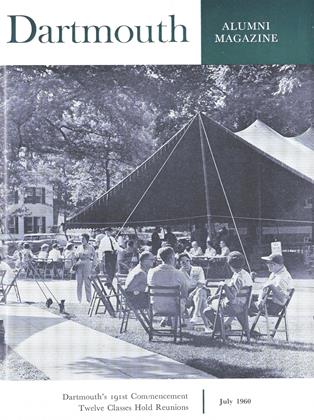By WalterJohnson '57. Boston: Little, Brown, 1960.390 pp. $6.00.
Writing in 1930, Felix Frankfurter observed that McKinley's administration marked the end of a period of federal laissez-faire and from that time on government was looked to as one of the positive "energies of civilization."
In 1600 Pennsylvania Avenue, Walter Johnson '37, chairman of the Department of History at the University of Chicago, analyzes the past thirty years of the Presidency in terms of this central theme. The "hero" of the study is the man of action, the energetic Chief Executive who responds forcefully to the nation's problems as he sees them. Under this criterion Franklin D. Roosevelt emerges as the clear winner - his was the Presidency of "resourcefulness." By the same token, Harry S. Truman is characterized as being "decisive," whereas Herbert Hoover and Dwight D. Eisenhower rate considerably lower on the Johnson evaluation scale.
This is, of course, somewhat of an oversimplification, for no one of the four men emerges either completely pure or completely tarnished. Professor Johnson devotes a section during his analysis of the Roosevelt administration to what he calls "limits to leadership" (i.e. the abortive Supreme Court reorganization plan, etc.) and he displays little sympathy for the small-time political aspects of the Truman regime. Conversely, Hoover receives credit for his rocklike, if misguided, sense of integrity, and Eisenhower is presented as a well-meaning and decent man. Yet, in the final analysis, the Democrats, or even more clearly Franklin D. Roosevelt, receive the nod of approval from the author.
As a sympathizer with the Republican cause, I must admit, quite frankly, that I experienced some difficulty in serenely digesting all the material in this study. Yet it is necessary to recognize that, when dealing with such a wealth of data as is to be found in thirty tumultuous years of Presidential history, any author has to be selective in his interpretation and approach if his work is to have any sense of central focus or continuity at all.
Hence, in fairness to Professor Johnson who does make his central viewpoint and criteria quite clear, I would classify this book as an informative, intelligent and absorbing resume of modern Presidential leadership, crammed full of relevant and important information which should be of interest to any discerning reader. As a matter of fact, for today's college student the section on the great depression alone, and the New Deal response to this cataclysmic event, contains invaluable background material which I am tempted to place in a "must" reading category. On the other hand, the older alumnus who experienced many of these occurrences at first hand should view this book as a fascinating, or perhaps exasperating (depending on his political viewpoint), summary of the major political personalities and environmental forces that have gone into the making of modern America.
 View Full Issue
View Full Issue
More From This Issue
-
 Feature
FeatureThe Disinterested Citizen and the Maintenance of Freedom
July 1960 By WHITNEY NORTH SEYMOUR, LL.D. '60 -
 Feature
FeatureThe Fifty-Year Address
July 1960 By ANDREW J. SCARLETT '10 -
 Feature
FeatureHONORARY DEGREE CITATIONS
July 1960 -
 Feature
Feature1960 Commencement
July 1960 By D.E.O. -
 Feature
FeatureThe Image of the Educated Man
July 1960 By HARRISON CASE DUNNING '60 -
 Feature
FeatureThe Reunion Week
July 1960
FRANK SMALLWOOD '51
-
 Books
BooksPOLITICAL THOUGHT IN AMERICA
April 1960 By FRANK SMALLWOOD '51 -
 Books
BooksMAN IN METROPOLIS: A BOOK ABOUT THE PEOPLE AND PROSPECTS OF A METROPOLITAN REGION.
APRIL 1966 By FRANK SMALLWOOD '51 -
 Books
BooksNEIGHBORHOOD GROUPS AND URBAN RENEWAL.
JULY 1966 By FRANK SMALLWOOD '51 -
 Books
BooksTHE ZONING GAME: MUNICIPAL PRACTICES AND POLICIES.
FEBRUARY 1967 By FRANK SMALLWOOD '51 -
 Books
BooksTHE POLITICS OF POLLUTION.
NOVEMBER 1970 By FRANK SMALLWOOD '51 -
 Books
BooksThe War Won?
November 1978 By FRANK SMALLWOOD '51
Books
-
 Books
BooksART AS AN INVESTMENT.
January 1962 By CHURCHILL P. LATHROP -
 Books
BooksTHE ELUSIVE PLATO
JUNE 1930 By Harold E. B. Speight -
 Books
BooksFROM THE GROUND UP,
October 1943 By Herbert F. West '22 -
 Books
BooksSPAIN'S IRON AND STEEL INDUSTRY.
OCTOBER 1968 By JOHN HURD '21 -
 Books
BooksHOW TO ADOPT A CHILD.
JULY 1967 By MICHAEL L. SLIVE '62 -
 Books
BooksBACKFIRE
JUNE 1932 By R. L. Woodcock

